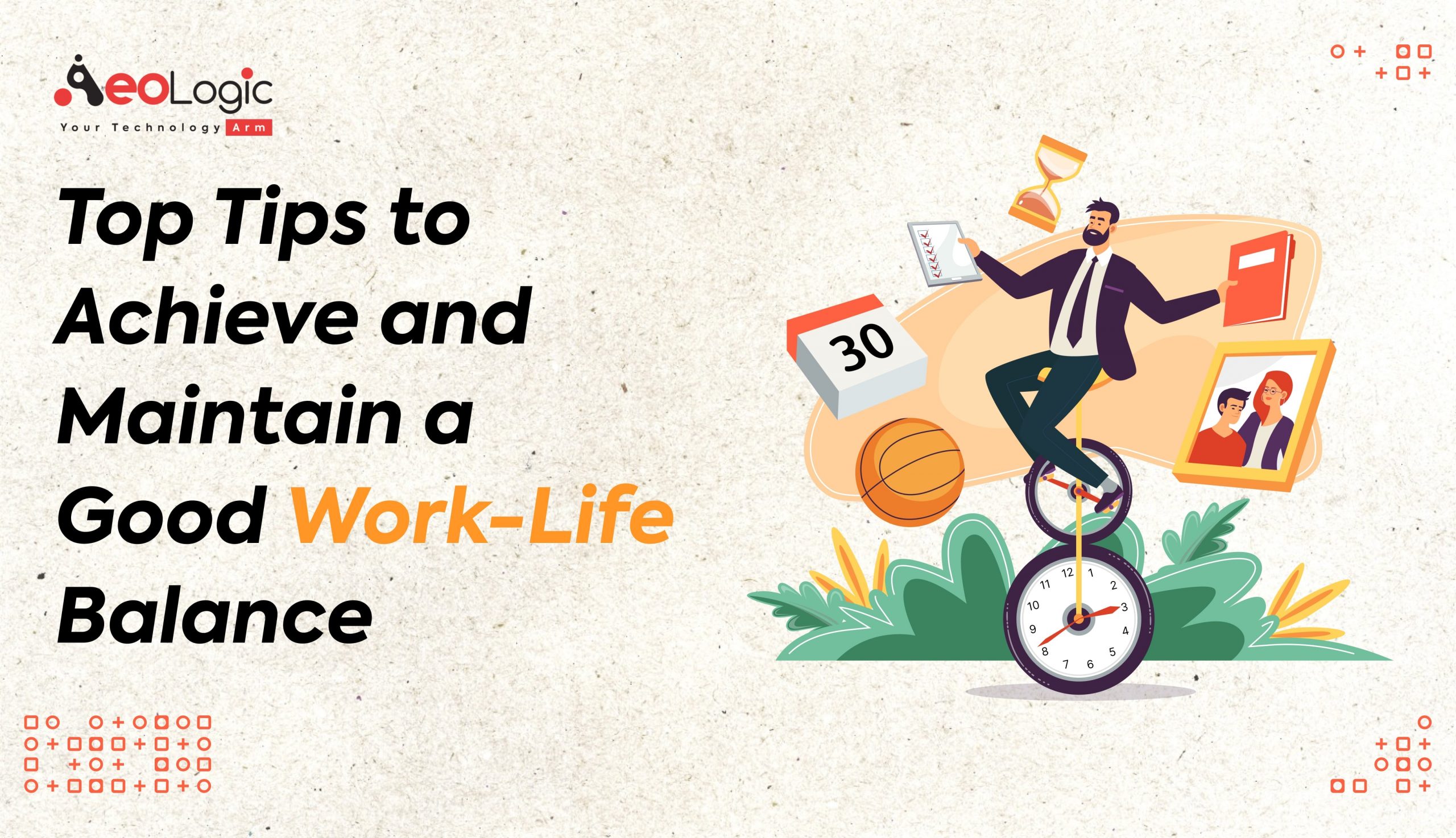Are you tired of juggling work and life, feeling like a circus performer instead of a successful professional? Overwork can lead to stress, and it’s high time we flip the script. We’ve got the perfect roadmap for you: our top 10 tips for a great work-life balance.
Achieving a work-life balance is not about finding more hours in the day, it’s about making the most of what you have. It’s about work that doesn’t drain you and a life that rejuvenates you.
Join us as we explore ways to regain control and enjoy both your work and personal life. Dive into our guide on How to Achieve Work-Life Balance Through Productivity and start transforming your daily routine into a more balanced, fulfilling life. You’re just a few steps away from living better.
Who among us doesn’t yearn for that perfect mix of a successful career and a fulfilling personal life? The concept of work-life balance might seem like a utopia, but trust me, with the right strategies, it’s achievable. It all starts with understanding that a work-life balance isn’t about the hours, but about the quality of time you spend at work and at home. I am going to share 10 transformative tips for work-life balance that will help you conquer the art of balancing your professional and personal life.
You will never feel truly satisfied by work until you are satisfied by life. – Heather Schuck, The Working Mom Manifesto.
What is the Concept of Work-Life Balance?
Work-life balance is like a seesaw. On one side, you have your job – the work you do, the time you spend in the office, and the stress that comes with it. On the other side, you have your personal life – your family, your hobbies, your relaxation time, and your friends.
When you have a good work-life balance, it means that your work and your personal life are in harmony. You have enough time for both without feeling overwhelmed or stressed out.
It doesn’t mean that you spend equal time on both sides. It’s more about how you manage your time so that both your job and your personal life get the attention they need. This balance can look different for each person. For some, it could mean working from home or having flexible work hours. For others, it might mean having free time after work without any job-related distractions.
The important part is to figure out what balance works best for you, and then try your best to maintain it.
Also Read: Smart Ways to Improve your Work-Life Balance
Key Benefits of Maintaining a Good Work-Life Balance
Maintaining a good work-life balance comes with a range of benefits that can significantly enhance your overall quality of life. It’s not just about reducing stress or avoiding burnout, it’s about leading a healthier, happier, and more fulfilling life.
Here are some key benefits:
- Reduced Stress: A balanced work and personal life allow you to decompress and relax, reducing stress levels.
- Better Health: With less stress and more time for self-care activities like exercise and proper nutrition, you can improve your physical and mental health.
- Increased Productivity: When you’re less stressed and more content, your focus and efficiency at work can increase, leading to better productivity.
- Improved Relationships: With a better work-life balance, you have more quality time to spend with family and friends, leading to stronger, healthier relationships.
- Personal Fulfillment: By making time for activities and people you love, you can experience a greater sense of personal satisfaction and happiness.
Also Read: Self-Discipline Benefits and its Importance in Your Life
Top 10 Tips to Achieve and Maintain a Good Work-Life Balance
Tip 1: Prioritize Your Tasks
The first step in achieving a good work-life balance is to understand your priorities. This can vary greatly among different individuals. For some, career growth might be the topmost priority, while for others, family or personal time might take the lead. What’s crucial is to acknowledge these priorities and plan your schedule accordingly.
Understand Your Priorities
- Identify what matters most to you in your personal and professional life.
- Make a list and rank them according to their significance.
- Structure your day around these priorities. This will ensure that your time and energy are being directed towards what truly matters to you.
Tip 2: Learn to Say No
As simple as it sounds, the power of saying “No” is immense. By setting boundaries, you define your limits and protect your personal time. If you don’t establish these boundaries, your work life will encroach upon your personal time, disrupting your work-life balance.
Set Boundaries
- It’s crucial to recognize when you’re stretching yourself too thin. Be mindful of your limits.
- Do not hesitate to decline additional responsibilities that disrupt your work-life balance.
- Create a clear distinction between your work time and personal time. Be disciplined in maintaining these boundaries.
Tip 3: Delegate and Automate
Are you doing everything yourself at work? Remember, delegation isn’t a sign of weakness; it’s a mark of a good leader. Learn to delegate tasks and trust your team members. Additionally, embrace automation tools that can handle repetitive tasks, saving you precious time and effort.
The Power of Delegation and Automation
- Identify tasks that can be delegated to others. Trust your team and delegate.
- Explore automation tools that can take over repetitive tasks, saving you hours.
- By delegating and automating, you free up time to focus on more significant tasks and personal pursuits.
Tip 4: Disconnect
In the era of remote working, the line between work and personal life is increasingly blurred. It’s crucial to disconnect from work during your off-hours. This means no work emails or calls unless absolutely necessary. A complete break allows your mind to recharge and refresh.
Unplugging from Work
- Designate time slots where you’re completely unplugged from work.
- Resist the urge to check work emails or calls during your off-hours.
- Taking a complete break from work will allow your mind to recharge and refresh.
Tip 5: Focus on Health
No work-life balance can be achieved without prioritizing your health. This includes both physical and mental health. Regular exercise, a balanced diet, and adequate sleep should be non-negotiable. Likewise, taking care of your mental health by engaging in stress-relieving activities is essential.
Health is Wealth
- Physical and mental well-being should never be compromised. Regular exercise, a balanced diet, and enough sleep are a must.
- Carve out time for stress-relieving activities like yoga, meditation, or simply reading a book.
- Remember, a healthy body and mind improve productivity and contribute to a balanced life.
Tip 6: Seek Support
Whether it’s at work or home, seeking help when you need it is critical. It could be from colleagues, family members, or professional counselors. You don’t have to do everything yourself. Remember, it’s okay to ask for help.
It’s Okay to Ask for Help
- You are not alone. Seek help from colleagues, family, or professional counselors when needed.
- Leverage your support network to manage responsibilities effectively.
- Don’t forget, seeking help is not a sign of weakness, but a smart way to balance your life.
Tip 7: Set Realistic Goals
While ambition is good, setting unrealistic goals can lead to stress and disappointment. It’s important to set achievable goals for both work and personal life. Being realistic about what you can accomplish will help maintain a harmonious balance.
Keep it Real
- Set achievable goals for your work and personal life.
- Don’t pressure yourself to meet unrealistic expectations.
- Having realistic goals and achieving them will boost your confidence and contribute to a harmonious balance.
Tip 8: Plan Quality Time
It’s not about how much time you spend at work or with family, but the quality of that time. Make sure the time you spend is meaningful and rejuvenating. This could mean dedicated family dinners, or short breaks during work to recharge.
Quality Over Quantity
- Time spent doesn’t matter as much as how you spend it. Make sure it’s meaningful and rejuvenating.
- Be present in the moment, whether it’s a family dinner or a quick coffee break during work.
- This will help you recharge and feel satisfied with your time management.
Tip 9: Continuous Learning
Your journey towards a balanced work-life isn’t a one-time task but a continuous process. Constant learning and adapting to new strategies for work-life balance are crucial. Read books, listen to podcasts, or attend workshops that promote this concept.
Always Be Learning
- Learning doesn’t stop when you achieve a balanced life. Keep exploring new strategies.
- Read books, listen to podcasts, or attend workshops that promote work-life balance.
- This ongoing process of learning will ensure you stay adaptable and resilient in maintaining balance.
Tip 10: Embrace Flexibility
Flexibility is the key to maintaining a good work-life balance. Understand that things don’t always go as planned. Be open to changes and adapt accordingly. This applies to both your work schedule and personal life.
Be Adaptable
- Things may not always go as planned. Be ready to adjust and adapt.
- Flexibility in your work schedule and personal life can be key to managing unforeseen circumstances.
- An adaptable mindset will help you maintain balance even when things get a little off track.
Balance is not better time management, but better boundary management. Balance means making choices and enjoying those choices. – Betsy Jacobson.
Also Read: Top Tips to Improve Your Work-life Balance
Final Words
Remember, these tips for work-life balance aren’t one-size-fits-all. You need to find what works best for you. While achieving a good work-life balance might seem daunting initially, trust me, it’s worth it. You’ll notice the changes not only in your personal and professional life but also in your overall well-being.
As we wrap up, remember that balancing work and life isn’t about perfection, but about creating a life where you feel content and fulfilled. So, embrace these tips for work-life balance and start your journey towards a more balanced and enriched life.









